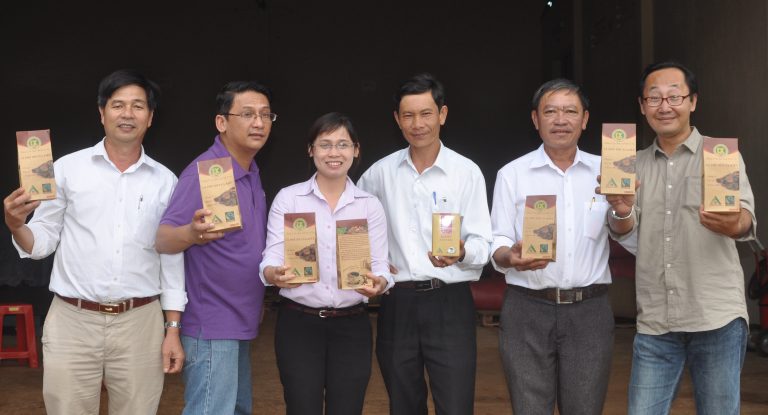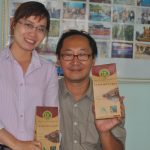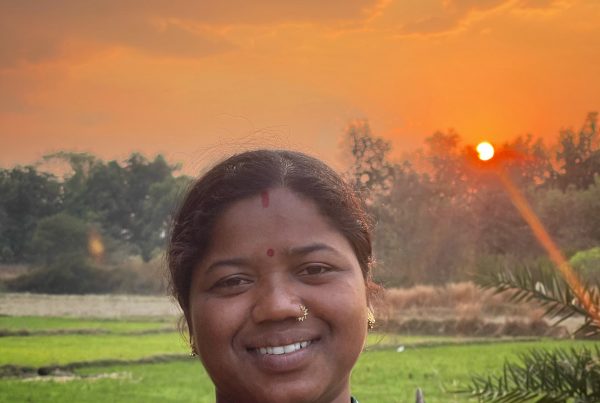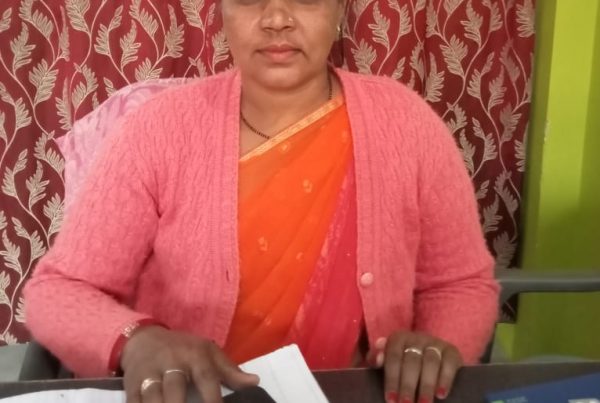Fairtrade-certified coffee producers in Vietnam are expanding to local markets to boost sales and supplement their income.
Over the last three decades, Vietnam has become the second largest coffee producer in the world, after Brazil, with the aid of government investment in the expansion of the coffee export sector. But now Fairtrade-certified Vietnamese coffee producers are training their eyes on the local market by producing a special brand of coffee powder locally.

The Fairtrade Asia Pacific team with the Vietnam Fairtrade-certified producers who are now packaging and selling their coffee in the local market
In 2014, a number of Fairtrade-certified cooperatives were trained on value chain management by Fairtrade, and they began thinking of solutions that could boost sales. With the help of Fairtrade Asia Pacific, some of the cooperatives decided to produce their own coffee powder and sell it with the Fairtrade Mark. Every year, Fairtrade coffee producers receive almost $700,000 in Fairtrade Premium, even though only 30 per cent of their coffee is sold under Fairtrade terms. This means that many sell the rest of their produce in the conventional market, decreasing the net income of the farmers.
Today, there are three cooperatives in Vietnam – Ea Kiet Fair Agriculture Cooperative, Thuan An Cooperative, and Cau Dat, which is a subgroup of Thuan An – who are now Fairtrade license holders. These cooperatives sell almost 3.2 tonnes of coffee powder – a mix of Robusta and Arabica – in the domestic market. “I migrated to the south [of Vietnam] to find a better life long time ago,” said Mr. Phuc, the chairman of Ea Kiet Cooperative. “I found coffee to be the future. I joined the cooperative and became its chairman. We decided to become Fairtrade certified [in 2008] so that we can benefit from the Fairtrade market. We obtained pretty good Fairtrade Premium.”
Over the last few years, the Fairtrade Premium has been invested in building a road for the community, which has eased access to farmers and schools [Read more here]. Apart from that the Premium has also gone towards building houses for the less privileged people in the community, installing a light system on the road, education scholarship and supporting disabled members of the village in the form of wheelchairs. A portion of the Premium has also been invested back in the business. Over 300 households have got trees to plant for their shade-grown coffee as well as protective gear, while over 520 households received bio-fertilisers. Training has been offered on climate change, water conversation and cultivation methods.
Mr. Phuc said that because not all their coffee is sold on Fairtrade terms, often they would sell a large amount to the conventional market. “That brought little benefit to us,” he said. “We thought why not sell it as coffee powder with nice packaging with the Fairtrade Mark on it?
The coffee powder retails at supermarkets in the Saigon Trade Cooperatives. The cooperatives now plan to partner with cooperative movements, the local coop marts and the government to reach the larger domestic and international market. Ea Kiet Cooperative and Thuan An Cooperative sell directly to the market, but also use additional promotional methods such as trade shows and telephone marketing, and have forged a collaboration with the Vietnam Cooperative Association. “Thanks to Fairtrade, we know how to increase our income,” said Mr. Ha, chairman of Thuan An Cooperative. “Now we are increasing the value of our product and planning to sell more of our coffee powder with the Fairtrade Mark on it to local retailers.”
Fairtrade Asia Pacific team members have introduced the product to the EU Trade Consulate, as a way of reaching out to the European community living in Vietnam. “We expect that in the long run, Vietnamese coffee will not only sell in the European Market in the form of green beans, but also the end product – coffee powder – to our neighbouring countries and the EU with Fairtrade’s support,” said Mr. Ha.
The cooperatives estimate that they can earn a profit of almost $50,000 per year, which they hope to invest back in the community. This, they hope, would motivate farmers to produce coffee powder of very high quality and ultimately lead to satisfied customers.
Contributed by Erwin Novianto, principal-SEA, Fairtrade Asia Pacific




